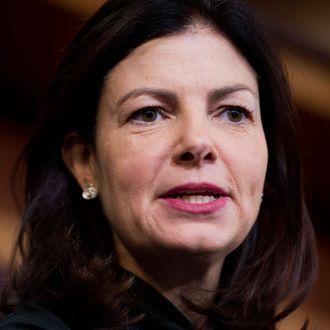
It’s understandable that people are very scared about opioids at the moment. As Drake Baer pointed out last week, the drugs killed more than 24,000 Americans in 2014, and opioid misuse is seen as an increasingly dire public-health crisis, especially in light of America’s growing population of pain-addled people who are middle-aged and older. Fentanyl is the current target of a lot of this anxiety — a synthetic opioid that’s often used in painkillers, it is extremely potent, was responsible for Prince’s death, and appears to be misused in dangerous ways by a lot of people.
That’s where Republican Senator Kelly Ayotte of New Hampshire comes in. Her state is being “ravaged” by opioid deaths, notes Roll Call, so she’s trying to add a measure into Congress’s big defense bill that would harshen penalties for fentanyl traffickers:
Ayotte’s amendment, which is similar to a bill she offered last year, would lower the amount of illicit drugs that would trigger mandatory sentences for manufacturing, distributing or possession with the intent to distribute.
For example, current law states someone with 40 grams of a mixture or substance containing fentanyl would trigger a five-year mandatory sentence. Ayotte wants to change that threshold from 40 to 2 grams.
Two grams is not a lot of grams, which is part of the reason Ayotte’s proposed bill is raising eyebrows among those who have tried to make the fight against drug abuse less punishment-focused. In the past, laws ostensibly geared at “traffickers” that set the definition of that term at a low threshold have led to terrifying numbers of nonviolent drug users being sent to prison. That’s because these laws eliminate the need for law enforcement to actually prove a suspect is a trafficker in any meaningful sense; simply by having a certain amount of a drug on their person, they are one by definition, at least in the eyes of the court. As Michael Collins, the deputy director of the Drug Policy Alliance’s Office of National Affairs, told Roll Call, “Prosecutors will often use these trafficking charges against users,” and he suspects the same will happen if Ayotte’s amendment becomes law. (Update: After this article went up, Collins emailed me to point out that in some cases the threshold at which Ayotte’s proposed mandatory minimums would kick in would be 0.5 grams, not 2 grams. There’s an explanation from Families Against Mandatory Minimums here.)
When people are terrified of an unknown, unbeatable-seeming menace that feels like a threat to them and their kids, it’s easy for them to embrace shortsighted solutions — this is a fundamental aspect of human psychology that is worth keeping in mind whenever widespread fear is afoot. The infamous Rockefeller drug laws, for instance, came about partly because legitimately serious crime problems in Harlem and elsewhere swayed many citizens to advocate for a harsher anti-drug approach.
At no point did these citizens — well, most of them, anyway — say to themselves, “Wouldn’t it be great if we locked up countless people for years, for basically no reason?” At the time, “going after pushers” felt like the right thing to do, because fear has a way of narrowing our focus, of preventing us from thinking things through fully. Step 1 — “Punish the dealers! — seduces everyone; Step 2 — “Lots of people who aren’t dealers get punished as well” — doesn’t even enter the conversation.
If Ayotte and the other folks entrusted with responding to the opioid problem aren’t careful — if they put on those fear blinders, or try to use them for electoral gain — they could end up repeating some rather tragic mistakes from the past.




